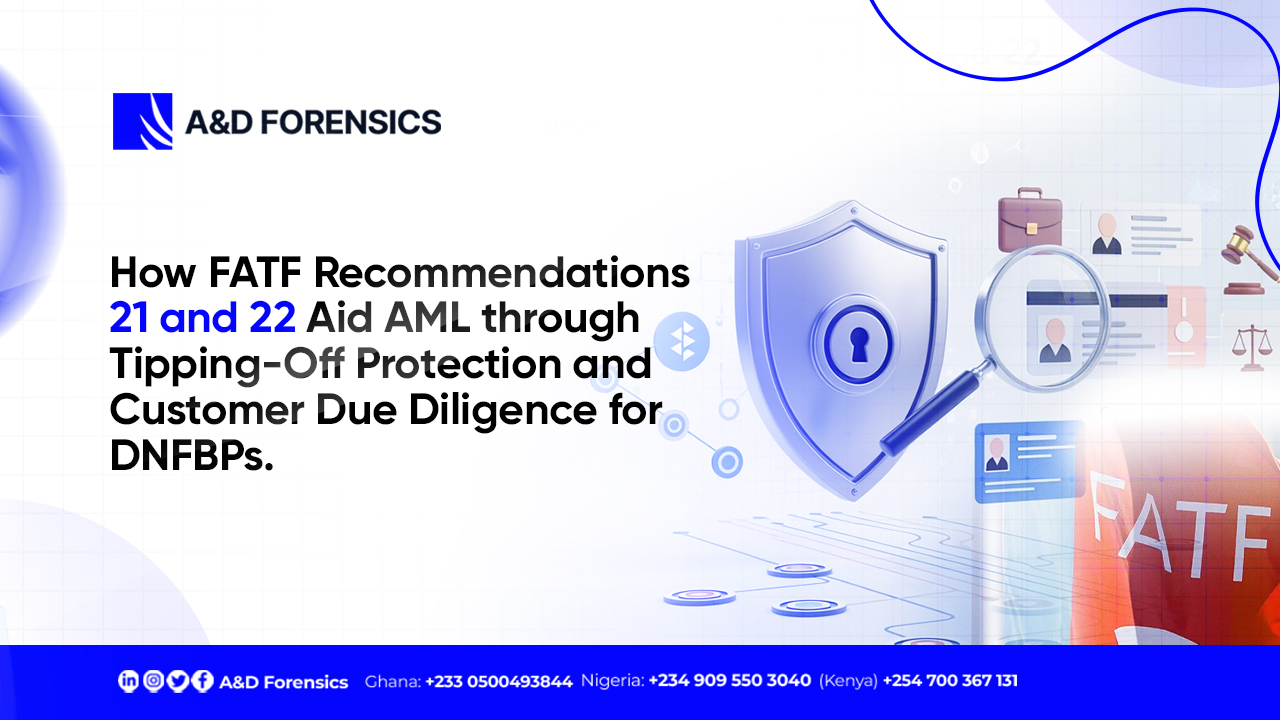FATF Recommendation 21 and FATF Recommendation 22 are central to strengthening global AML/CFT compliance frameworks by ensuring both the confidentiality of suspicious transaction reporting and the extension of customer due diligence (CDD) requirements to Designated Non-Financial Businesses and Professions (DNFBPs). As DNFBPs such as lawyers, accountants, real estate agents, dealers in precious metals, and casinos increasingly face risks of money laundering, terrorist financing, and misuse by criminals, the Financial Action Task Force (FATF) introduced these Recommendations to ensure they can safely report suspicious activities and clearly identify clients.
Understanding FATF Recommendation 21: Tipping-Off Protection and Confidentiality.
FATF Recommendation 21 requires financial institutions and DNFBPs to maintain the confidentiality of suspicious transaction reports (STRs) and prohibits any disclosure or “tipping-off” to customers or third parties that a report has been filed or an investigation is underway. It also provides legal protection to employees and institutions that submit STRs in good faith, shielding them from civil and criminal liability.
How FATF Recommendation 21 Aids Anti-Money Laundering (AML).
- Protects Investigations: FATF Recommendation 21 ensures that criminals are not alerted when they are under scrutiny, preventing them from moving funds, destroying evidence, or fleeing.
- Encourages Reporting: By granting legal protection to staff and institutions, FATF Recommendation 21 builds confidence to file STRs without fear of lawsuits or breaches of confidentiality.
- Strengthens FIU Intelligence: FATF Recommendation 21 ensures that STRs reach Financial Intelligence Units (FIUs) intact, enhancing the quality and reliability of financial intelligence.
- Preserves Integrity of the AML System: FATF Recommendation 21 emphasizes the confidential handling of reports, safeguarding trust and credibility in AML/CFT frameworks.
- Promotes Cooperation: FATF Recommendation 21 supports secure information sharing between reporting entities, regulators, and law enforcement without compromising investigations.
Understanding FATF Recommendation 22: Customer Due Diligence for DNFBPs.
FATF Recommendation 22 is one of the key standards issued by the FATF to combat money laundering and terrorist financing. It specifically extends core AML/CFT obligations such as CDD, record-keeping, and suspicious transaction reporting to DNFBPs. These include lawyers and notaries, accountants, real estate agents, dealers in precious metals and stones, and trust and company service providers.
How FATF Recommendation 22 Aids Anti-Money Laundering (AML).
- FATF Recommendation 22 strengthens AML efforts by preventing money launderers from shifting illicit funds through DNFBPs instead of banks.
- One of the central requirements of FATF Recommendation 22 is that DNFBPs conduct proper CDD when establishing business relationships or carrying out transactions.
- With Recommendation 22, DNFBPs are obligated to file Suspicious Transaction Reports whenever they detect red flags.
- Real estate, luxury goods, and professional services are attractive to criminals for laundering large sums of money. FATF Recommendation 22 compels these industries to maintain transaction records and perform due diligence.
- By aligning DNFBPs with financial institutions, FATF Recommendation 22 ensures consistency in AML standards worldwide.
5 Key Impacts of FATF Recommendation 21 and FATF Recommendation 22.
- FATF Recommendation 21 ensures STRs are filed safely and confidentially, without alerting suspects.
- FATF Recommendation 22 obligates DNFBPs to conduct CDD, revealing red flags early in the client relationship.
- By providing legal safeguards, FATF Recommendation 21 encourages compliance officers and frontline staff to report red flags without fear of reprisal.
- With DNFBPs obligated to conduct due diligence and file STRs, the detection net widens. Suspicious activity in real estate, luxury goods, or professional services can now be identified alongside banking transactions, giving regulators a fuller picture of money laundering schemes.
- Together, FATF Recommendation 21 and FATF Recommendation 22 promote confidential reporting, transparency, and accountability across both financial and non-financial sectors.
5 Implementation Challenges of FATF Recommendation 21 & FATF Recommendation 22.
While FATF Recommendation 21 and FATF Recommendation 22 are critical, implementation comes with challenges:
- Ensuring that staff avoid tipping off while still maintaining transparent communication with clients can be challenging in practice.
- Employees may hesitate to report suspicious activity if they are not properly trained or lack confidence in whistleblower protections.
- Smaller DNFBPs, such as law or accounting firms, often lack the resources to implement robust AML controls.
- DNFBPs face difficulties in verifying customer identities, tracing beneficial owners, and applying risk-based due diligence.
- Different countries implement FATF Recommendation 21 and FATF Recommendation 22 unevenly, creating regulatory gaps that criminals may exploit.
Conclusion
FATF Recommendation 21 and FATF Recommendation 22 are vital pillars in the global fight against money laundering and terrorist financing. By protecting whistleblowers through tipping-off restrictions and extending Customer Due Diligence obligations to DNFBPs, these recommendations close critical gaps in the financial system. Together, FATF Recommendation 21 and FATF Recommendation 22 not only strengthen transparency and trust but also ensure that both financial institutions and non-financial professionals play their part in securing the global economy against criminal abuse.
Explore FATF Recommendation 1 to 14 in our previous blog:
- FATF Recommendation 1 and 2
- FATF Recommendation 3 and 4
- FATF Recommendation 5 and 6
- FATF Recommendation 7 and 8
- FATF Recommendation 9 and 10
- FATF Recommendation 11 and 12
- FATF Recommendation 13 and 14
- FATF Recommendation 15 and 16
- FATF Recommendation 17 and 18
- FATF Recommendation 19 and 20
Contributor: Ibrahim Anuoluwapo Azeez






